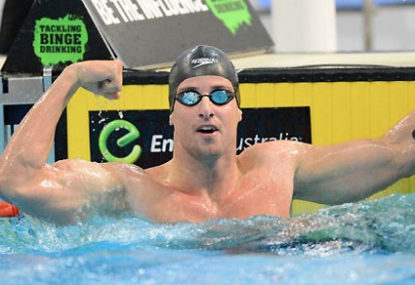JackJumpers' NBL title was special - but where does it sit among Tasmania’s top ten sporting moments?
It’s a pretty good time to be a Tasmanian sports fan right now. After years in the sporting wilderness with not much to celebrate,…

The use of prescription sleeping pills, combined with energy drinks, may be rampant in both the AFL and the NRL. New Zealand Warriors doctor John Mayhew says the abuse of prescription drugs is “widespread.”
When taken with energy drinks or alcohol, sleeping drugs can produce an amphetamine-like high without falling foul of anti-doping rules.
“Basically, [players] get a high and it doesn’t contravene any of the existing drug testing protocols,” says Mayhew.
Ben Cousins and Grant Hackett have had high profile battles with sleeping pills, and it this week emerged that two All Blacks – Israel Dagg and Corey Jane – were indulging during the 2011 Rugby World Cup.
Should we be surprised? Modern society is awash with prescription drugs. Popping a pill is what we do, especially in the west; especially if it gives us a boost in energy or helps us sleep.
In 2011, doctors in the U.S. wrote 4.02 billion prescriptions for medication. Based on the current US population that’s roughly 13 prescriptions for every man, woman, and child living in America. The previous year, there were 38,329 deaths from prescription drug overdoses.
Last year in England, 15.3 million National Health Service prescriptions were made for sleep medication.
According to the National Drug Strategy Household Survey in 2010, 3.2 per cent of the Australian population had used sleeping pills for non-medical purposes at some stage of their life. It is said that up to 10 per cent of the population currently rely on sleeping pills.
These pills can be fatal. Benzodiazepines contributed to 56 deaths in Victoria in 2010, representing 16.6 per cent of total drug-induced or drug-related deaths investigated by the Coroners Court of Victoria in that year. Zolpidem, apparently popular in the NRL, can produce dangerous side effects such as sleep-walking on high-rise balconies.
The NRL have suggested that it might ban sleeping pills next season, pending the outcome of a data gathering exercise.
The intent behind a possible ban is a noble one, but it would be impractical. A sleeping pill is not an explicit performance enhancer and if banned something else – something worse – will replace it. Why should sports stars be singled out in the battle against prescription drug abuse? The problem is sociey’s, not sports.
At least three Australians die every day from prescription drug overdoses. According to the Australian Bureau of Statistics, overdose deaths totaled 1,383 victims in 2011.
It’s time to talk about reducing society’s dependence on prescription drugs, which in turn will benefit sport.
The first and most obvious idea is more investment in education. The more people know about the harm of prescription drugs, the better equipped they will be to make decisions about what and how much they take.
Secondly, drug-taking databases have been established in some US states. The database tracks prescriptions, tying them to an individual and the doctor who prescribed them. This allows health and law enforcement officials to see if people are going to multiple doctors to get prescriptions for the same drug, often a sign they are abusing the drug.
This could work in Australia.
Another useful idea from the US is the Federal Government’s drug-disposal program. The National Take-Back initiative allows people who have prescription drugs to hand them over at collection sites, no questions asked.
A degree of immunity from criminal charges if the activity becomes illegal could be helpful, too, for individuals who are genuinely seeking to help themselves or others experiencing overdoses. Sandor Earl is a prime example of where this could have worked.
Finally, Peter Fitzsimons has suggested that a concussion commissioner should be appointed to deal with the rise of head injuries in contact sports.
What about an independent health commissioner for all professional sports leagues?
If the concussion and sleeping pill episodes have taught us anything, it’s that there are too many vested interests in sports that are compromising the health of young combatants.